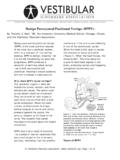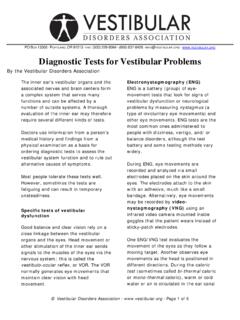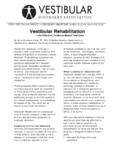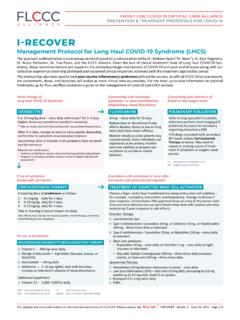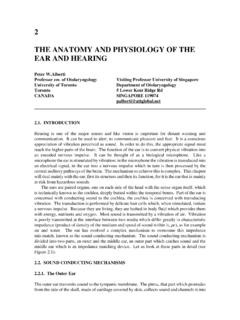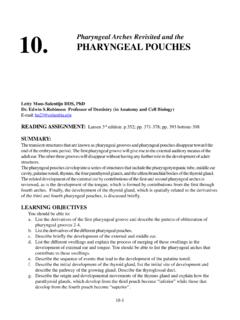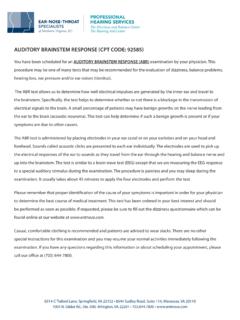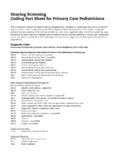Transcription of Tinnitus Ringing in the Ears - Home | Vestibular …
1 Vestibular Disorders Association Page 1 of 11 PO BOX 13305 PORTLAND, OR 97213 FAX: (503) 229-8064 (800) 837-8428 Tinnitus : Ringing in the Ears An Overview By the Vestibular Disorders Association What is Tinnitus ? Tinnitus is abnormal noise perceived in one or both ears or in the head. Tinnitus (pronounced either TIN-uh-tus or tin-NY-tus ) may be intermittent, or it might appear as a constant or continuous sound. It can be experienced as a Ringing , hissing, whistling, buzzing, or clicking sound and can vary in pitch from a low roar to a high squeal. Tinnitus is very common. Most studies indicate the prevalence in adults as falling within the range of 10% to 15%, with a greater prevalence at higher ages, through the sixth or seventh decade of Gender distinctions are not consistently reported across studies, but Tinnitus prevalence is significantly higher in pregnant than non-pregnant The most common form of Tinnitus is subjective Tinnitus , which is noise that other people cannot hear.
2 Objective Tinnitus can be heard by an examiner positioned close to the ear. This is a rare form of Tinnitus , occurring in less than 1% of Chronic Tinnitus can be annoying, intrusive, and in some cases devastating to a person s life. Up to 25% of those with chronic Tinnitus find it severe enough to seek It can interfere with a person s ability to hear, work, and perform daily activities. One study showed that 33% of persons being treated for Tinnitus reported that it disrupted their sleep, with a greater degree of disruption directly related to the perceived loudness or severity of the ,6 Causes and related factors Most Tinnitus is associated with damage to the auditory (hearing) system, although it can also be associated with other events or factors: jaw, head, or neck injury; exposure to certain drugs; nerve damage; or vascular (blood-flow) problems. With severe Tinnitus in adults, coexisting factors may include hearing loss, dizziness, head injury, sinus and middle-ear infections, or mastoiditis (infection of the spaces within the mastoid bone).
3 Significant factors associated with mild Tinnitus may include meningitis (inflammation of the membra-nous covering of the brain and spinal cord), dizziness, migraine, hearing loss, or Forty percent of Tinnitus patients have decreased sound tolerance, identified as the sum of hyperacusis (perception of over-amplification of environmental Vestibular Disorders Association Page 2 of 11 sounds) and misophonia/ phonophobia (dislike/fear of environmental sounds).8 While most cases of Tinnitus are associated with some form of hearing impairment, up to 18% of cases do not involve reports of abnormal Ear disorders Hearing loss from exposure to loud noise: Acute hearing depends on the microscopic endings of the hearing nerve in the inner ear. Exposure to loud noise can injure these nerve endings and result in hearing loss. Hearing damage from noise exposure is considered to be the leading cause of Tinnitus . Presbycusis: Tinnitus can also be related to the general impairment of the hearing nerve that occurs with aging, known as presbycusis.
4 Age-related degeneration of the inner ear occurs in 30% of persons age 65 74, and in 50% of persons 75 years or Middle-ear problems: Tinnitus is reported in 65% of persons who have preoperative otosclerosis (stiffening of the middle-ear bones),11 with the Tinnitus sound typically occurring as a high-pitched tone or white noise rather than as a low Otitis media (middle-ear infection) can be accompanied by Tinnitus , which usually disappears when the infection is treated. If repeated infec-tions cause a cholesteatoma (benign mass of skin cells in the middle ear behind the eardrum), hearing loss, tinni-tus, and other symptoms can Objective Tinnitus has been associated with myoclonus (contraction or twitching) of the small muscles in the middle ,15 Conductive hearing loss resulting from an accumulation of earwax in the ear canal can sometimes cause Tinnitus . Vestibular disorders: Hearing impairment and related Tinnitus often accompany dysfunction of the balance organs ( Vestibular system).
5 Some ves-tibular disorders associated with Tinnitus include M ni re s disease and secondary endolymphatic hydrops (resulting from abnormal amounts of a fluid called endolymph collecting in the inner ear) and perilymph fistula (a tear or defect in one or both of the thin membranes between the middle and inner ear). Vestibulo-cochlear nerve damage and central auditory system changes The vestibulo-cochlear nerve, or eighth cranial nerve, carries signals from the inner ear to the brain. Tinnitus can result from damage to this nerve. Such damage can be caused by an acoustic neuroma, also known as a Vestibular schwannoma (benign tumor on the Vestibular portion of the nerve), Vestibular neuritis (viral infection of the nerve), or microvascular compression syndrome (irritation of the nerve by a blood vessel). The perception of chronic Tinnitus has also been associated with hyperactivity in the central auditory system, especially in the auditory In such cases, the Tinnitus is thought to be triggered by damage to the cochlea (the peripheral Vestibular Disorders Association Page 3 of 11 hearing structure) or the vestibulo-cochlear nerve.
6 Head and neck trauma Compared with Tinnitus from other causes, Tinnitus due to head or neck trauma tends to be perceived as louder and more severe. It is accompanied by more frequent headaches, greater difficulties with concentration and memory, and a greater likelihood of Somatic Tinnitus is the term used when the Tinnitus is associated with head, neck, or dental injury such as misalignment of the jaw or temporomandibular joint (TMJ) and occurs in the absence of hearing loss. Characteristics of somatic Tinnitus include intermittency, large fluctuations in loudness, and variation in the perceived location and pattern of its occurrence throughout the Medications Many drugs can cause or increase Tinnitus . These include certain non-steroidal anti-inflammatory drugs (NSAIDs, such as Motrin, Advil, and Aleve), certain antibiotics (such as gentamicin and vancomycin), loop diuretics (such as Lasix), aspirin and other salicylates, quinine-containing drugs, and chemotherapy medications (such as carboplatin and cisplatin).
7 Depending on the medication dosage, the Tinnitus can be temporary or Vascular sources Pulsatile Tinnitus is a rhythmic pulsing sound that sometimes occurs in time with the heartbeat. This is typically a result of noise from blood vessels close to the inner ear. Pulsatile Tinnitus is usually not serious. However, sometimes it is associated with serious conditions such as high or low blood pressure, hardening of the arteries (arteriosclerosis), anemia, vascular tumor, or aneurysm. Other possible causes Other conditions have been linked to Tinnitus : high stress levels, the onset of a sinus infection or cold, autoimmune disorders (such as rheumatoid arthritis or lupus), hormonal changes, diabetes, fibromyalgia, Lyme disease, allergies, depletion of cerebrospinal fluid, vitamin deficiency, and exposure to lead. In addition, excessive amounts of alcohol or caffeine exacerbate Tinnitus in some people. Diagnosis Examination by a primary care physician will help rule out certain sources of Tinnitus , such as blood pressure or medication problems.
8 This doctor can also, if necessary, provide a referral to an ear, nose, and throat specialist (an otolaryngologist, otologist, or neurotologist), who will examine the ears and hearing, in consultation with an audiologist. Their evaluations might involve extensive testing that can include an audiogram (to measure hearing), a tympanogram (to measure the stiffness of the eardrum and help detect the Vestibular Disorders Association Page 4 of 11 presence of fluid in the middle ear), otoacoustic emissions testing (to provide information about how the hair cells of the cochlea are working), an auditory brainstem response test (to measure how hearing signals travel from the ear to the brain and then within parts of the brain), electrocochleography (to measure how sound signals move from the ear along the beginning of the hearing nerve), Vestibular -evoked myogenic potentials (to test the functioning of the saccule and/or inferior Vestibular nerve), blood tests, and magnetic resonance imaging (MRI).
9 Neuropsychological testing is also sometimes included to screen for the presence of anxiety, depression, or obsessiveness which are understandable and not uncommon effects when Tinnitus has disrupted a person s life. Treatment If a specific cause of the Tinnitus is identified, treatment may be available to relieve it. For example, if TMJ dysfunction is the cause, a dentist may be able to relieve symptoms by realigning the jaw or adjusting the bite with dental work. If an infection is the cause, successful treatment of the infection may reduce or eliminate the Tinnitus . Many cases of Tinnitus have no identifiable cause, however, and thus are more difficult to treat. Although a person s tolerance of Tinnitus tends to increase with time,19 severe cases can be disturbing for many years. In such chronic cases, a variety of treatment approaches are available, including medication, dietary adjustments, counseling, and devices that help mask the sound or desensitize a person to it.
10 Not every treatment works for every person. Masking devices A masking device emits sound that obscures, though does not eliminate, the Tinnitus noise. The usefulness of maskers is based on the observation that Tinnitus is usually more bothersome in quiet surroundings20 and that a competing sound at a constant low level, such as a ticking clock, whirring fan, ocean surf, radio static, or white noise produced by a commercially available masker, may disguise or reduce the sound of Tinnitus , thus making it less noticeable. Some Tinnitus sufferers report that they sleep better when they use a masker. In some users, maskers produce residual inhibition Tinnitus suppression that lasts for a short while after the masker has been turned off. Hearing aids are sometimes used as maskers. If hearing loss is involved, properly fitted hearing aids can improve hearing and may reduce Tinnitus temporarily. However, Tinnitus can actually worsen if the hearing aid is set at an excessively loud level.
